What do Melania Trump and Usha Vance have in common? Ambition
The former model and the Ivy League lawyer seem poles apart, but Melania Trump and Usha Vance share a resolve as hard as steel.
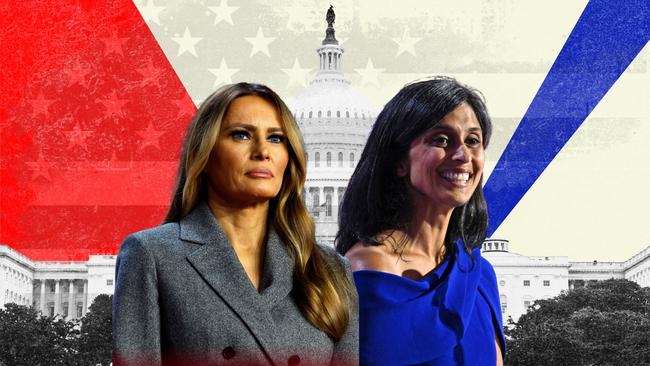
It’s set to be one of the most anti-immigration governments in recent history, but at today’s (Monday’s) inauguration the men who will become the president and vice-president of the United States will show how wedded they are, literally, to immigration.
Donald Trump is the only president in two centuries to have a wife born outside the US: Melania Trump, born Melanija Knavs, is an immigrant from what was then communist Yugoslavia, her grandfather Anton Ulcnik one of the most successful onion farmers of the region. Meanwhile, JD Vance is the first VP to have a spouse of colour, and of Asian and Hindu heritage. Usha (pronounced “Oosha") Vance, born Usha Chilukuri, has parents who immigrated to California from India just before she was born. Her grandfather, Rama Sastri, was an esteemed physics professor in Madras.
The first and second ladies are in a few ways superficially alike: they are both political ciphers who prefer to serve as the human “black box” of their husband’s stratospherically high-flying careers. They hide in plain sight, fitting into what has become the 21st-century political wifely straitjacket of a tall, slim female in a bodycon dress, their support of their husbands under the same tight control as their compression garments.
When pressed about her husband’s warning of the danger of “childless cat ladies” taking power - which, given her educational cohort, is likely many of her friends - Usha responded on Fox News last August: “What he was really saying is that it can be really hard to be a parent in this country.”
She also blurred out her background by talking about her parents arriving from “a different country” rather than naming India. Of old friends who were at their wedding but later dropped the couple like a hot potato, Usha said coolly: “It is hard to know that sometimes politics comes in the way of friendships.”
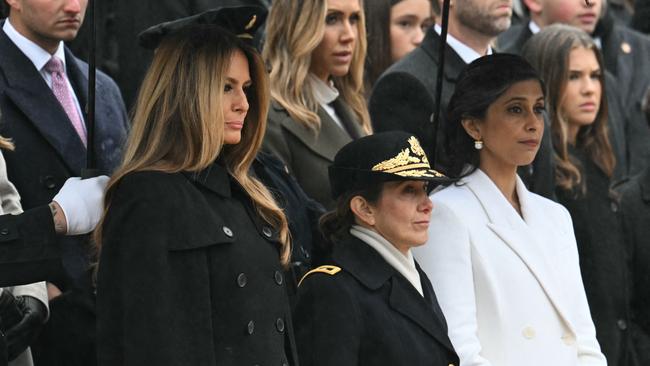
Yet both women have begun to wriggle beneath that chafing uniform in intriguing ways. For Melania it is her belief in abortion rights, revealed in Melania, her recent bestselling memoir, which appears genuine and a strategic benefit to soften her husband’s campaign against them.
Like Usha, she barely appeared in her husband’s campaign. Melania said in an interview with Fox & Friends recently that she’d move to the White House, except for when she “needs” to be in New York (where her son lives) or Palm Beach (with her father).
What influence, covert if any, will they have? And how do they each benefit from the trade that seems to operate at the heart of their respective marriages: the more the woman sacrificed - for Usha that includes liberal friends, a stellar career and free expression on matters such as Trump - the more power she can wield?
On most metrics the women are poles apart, and hopes for girls’ nights for first and second lady, nicknamed “Flotus” and “Slotus” (Michelle Obama called Jill Biden “my partner in crime” and said they drank wine together on Air Force One) are slim.
At 39 Usha has earned herself one of the most high-achieving and elite educations in the world, including stints at Yale and Cambridge, while Melania, 54, dropped out of her interior design studies for modelling. Yet Melania here is a higher rank, and with her son, Barron, at college, and her stepdaughter Ivanka out of the picture, her second run at first lady could be deemed her first. And Usha has her first taste of being a stay-at-home mother of three children, Ewan, Vivek and Mirabel, all aged under eight.
Usha was seen reading a copy of The Iliad on last year’s campaign trail, and once had a Goodreads account under her maiden name that rated more than 60 books, from Zadie Smith to Aleksandr Solzhenitsyn. Meanwhile, Melania’s English remains halting and Melania was written in simplistic prose, full of obvious obfuscations. She wrote, for instance, that the message daubed on a jacket she wore on a first lady visit to migrant children “I really don’t care, do u?” was “discreet”.
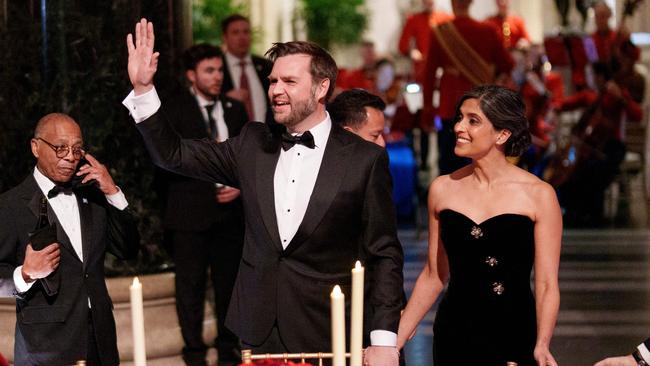
Usha has in many ways more in common with Michelle Obama: both were Democrat-voting Ivy League lawyers. Both, when they met their spouses, in Usha’s case at Yale Law School, acted in mentor roles. They had husbands who became darlings of the liberal elite with memoirs of their fractured childhoods, Vance’s Hillbilly Elegy and Obama’s Dreams from My Father, and both quit their legal careers when their husbands directed their sights on the White House.
While Melania says in her memoir she is comfortable with “the solitary life”, Vance says Usha tutored him in the arts of maximising “social capital”. Michelle helped to connect Barack, brought up by his white mother and grandparents in Hawaii, to the deeper roots of African-American history.
Usha was born into an educational elite: many relatives were academics in India and her parents were science professors in San Diego. At Yale it was Vance, from blue-collar Ohio, who cast himself as the immigrant, and Usha the native. Usha, her husband wrote in Hillbilly Elegy, “encouraged me to seek opportunities I didn’t know existed ... in a place that always seemed a little foreign, Usha’s presence made me feel at home”.
Vance wrote that he depended on Usha as his “spirit guide”. At a formal dinner with prestigious lawyers he was flummoxed by which fork to use. He excused himself to the restroom and called Usha, who gave him a crash course.
What did she see in him? There was possibly some erotic capital in his rough-hewn difference: Usha was listed as one of the 50 most beautiful students in a campus tabloid, The Rumpus. It said that “in the past most of her liaisons have been tall, handsome and conservative (though she herself is of a leftish persuasion)”.
It seems more likely that “Judusha”, as fellow students termed the couple, recognised in each other an ambition that was extraordinary even at Yale Law School. In their cohort’s edition of the prestigious The Yale Law Journal, Usha has a coveted top spot, while Vance is listed towards the bottom of the masthead. Christopher Lapinig, a former classmate, told The Cut magazine: “I distinctly remember him saying that one of the biggest things, maybe the biggest thing, that drew him to her was her ambition.”
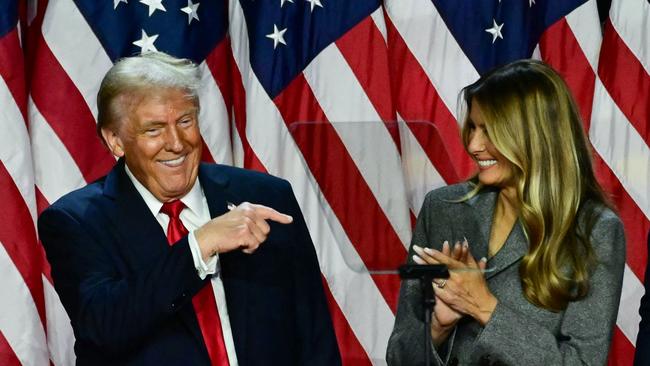
This is where Melania and Usha converge. They are defined by ambition, inscrutability and steeliness. Melania went to model castings straight off the plane from Europe. Usha clerked for two of the most conservative judges on the Supreme Court, including Trump’s contentious choice of Brett Kavanaugh.
But she also went on to become a litigator at a San Francisco law firm described in a legal magazine as in the “cool, woke” category. Friends from Yale say Usha kept her feelings and political opinions closed off; she was liked but “didn’t seem to have strong emotions”, one said to The Cut, adding: “She was never very vulnerable.” When in 2016 Trump’s “pussy-grabbing” comments were revealed, Melania said in her next TV interview to CNN: “Don’t feel sorry for me ... I can handle everything.”
For both, their husbands are prone to incontinent fits of anger while they remain implacable and literally in control. In Hillbilly Elegy Vance writes of regularly yelling at Usha, including one occasion when she consoled him on a poor job interview. “You’re just making excuses for weakness!” he shouts, “exploding” and “storming” out of the building. From the outside this may look like Usha was submitting, but for him it was quite the reverse.
Usha was directing his career in many ways, advising and coaching. At one point as a student he takes advice from his mentor, Amy Chua, the Yale law professor and author of The Battle Hymn of the Tiger Mother, a book that makes the case for driving one’s child to excellence rather than going soft.
In his book Vance says Chua advises him it was better to “prioritise Usha”, so he turned down a prestigious opportunity that could have risked their relationship. He outsourced his emotional control to Usha as well. “I couldn’t do it without Usha,” he writes, describing himself as an unexploded bomb and her as the calm bomb disposal expert. It wasn’t so much that he controls himself, but “with skill and precision ... Usha has learnt how to manage me”. He submits to her.
This steeliness emerges from the first page he writes about Usha in Hillbilly Elegy. It is obviously meant to be a romantic tribute but it is a strange one. He jokes with a friend that Usha “would have made an excellent heroine in an Ayn Rand novel”; being compared with a near-perfect, individualistic ubermensch is not a standard term of endearment.
Vance continues that Usha had “an extraordinarily direct way of speaking”. Where others may say things “meekly”, she’d say, simply, “’This is a pretty terrible argument.’ At a bar she looked up at a mutual friend of ours and said, without a hint of irony, ‘You have a very small head.’ I had never met anyone like her.”
In fact Vance had met someone quite a bit like Usha: the grandmother who raised him while his drug-addict mother was elsewhere. In 2020 Vance told the broadcaster Megyn Kelly on her podcast, “I’m one of those guys who really benefits from having a sort of powerful female voice on his left shoulder.” Once that had been his grandmother, but “now it’s Usha”. She gave him feedback on his book, “even when I didn’t want it”, he wrote. And on the eve of both their speeches to the Republican National Convention last summer, she stayed up in their hotel room workshopping his speech.
Vance told Kelly on air in 2017, “Usha is so defensive about the things that she really cares about.” For example, when their dog disgraced himself at doggy daycare, Usha’s response was: “He’s too good for that daycare anyway!” One can only imagine how defensive she would be of human disgrace. But Usha and Melania are capable of minor rebellions. Usha was careful to clarify in an interview with Fox News that she helped with her husband’s national convention speech, but not vice versa. “I actually wrote mine without his help, as I wanted him to hear it for the first time,” she said.
She chose her words carefully in the speech, not once mentioning “Trump” or “Republican”. She has strands of grey in her hair, prefers natural make-up and sometimes wears flat shoes; all, in the context of the hyper-glossy Republican aesthetic typified by the spike-heeled Melania, transgressions.
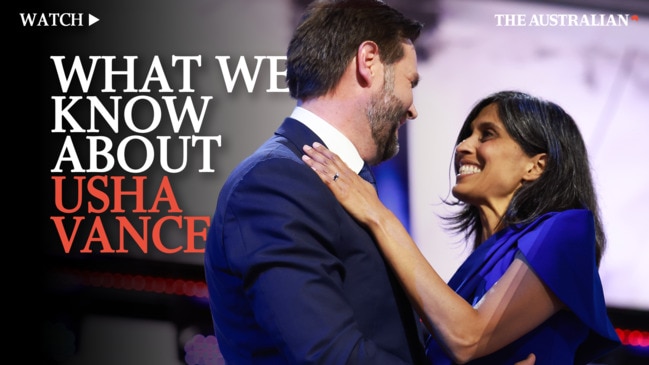
Melania said on Fox News last week: “I don’t always agree with what my husband is saying or doing, and that’s OK.” Usha said on Fox last August: “We come to different conclusions all the time, that’s part of the fun of being married.”
There is one final similarity between Melania and Usha. It is notable that they both come from very close and loving families, and each woman has one sister. Melania’s parents had suites at both the White House and Trump’s Florida home in Mar-a-Lago.
For Usha, her mother went to great lengths to support her daughter’s career. When Vance was pursuing politics in Ohio, Usha was offered a prestigious clerkship with a judge in Washington. The couple decided to live separately, despite this stint coinciding with the birth of their first child. Vance remained in Ohio, while Usha began the clerkship seven weeks after giving birth, and her mother, Lakshmi, took a sabbatical to move to Washington to look after the newborn. This unconventional arrangement lasted a year.
Trump’s career has often depended on Melania’s in-bred loyalty to family life. Likewise, Vance frequently expresses amazement at Usha’s supportive family, who didn’t “go in for the kill” to exploit weakness as Vance’s mother (or Trump’s father) might have done. As the two couples move into their new homes in Washington, both the president and the vice-president have already become immigrants themselves to a foreign world of functioning, if increasingly tested, family bonds.
The Times



